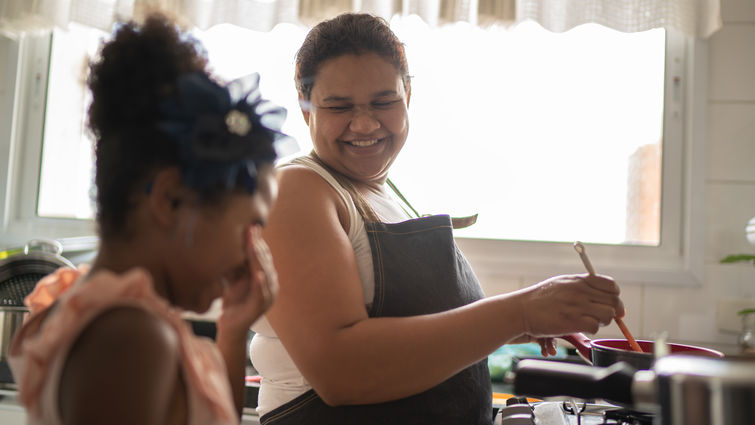
Cooking
The holidays are a wonderful time for families to come together to celebrate and connect with one another, but they can also be a time of stress for many — especially those struggling with issues around food.
Nicole Goolsby, LMFT, CEDS, has worked as an eating disorder therapist for the past five years, helping teenagers and adults who suffer from a variety of mental health issues related to food. The clinical therapist works with a team that includes a psychiatrist and a registered dietitian — all working together to help clients identify signs that they may be struggling and provide treatment.
Goolsby says signs of an eating disorder can include feeling stressed around food, being fearful of weight gain, feeling guilty after eating, or skipping out on events that are food-focused.
“These behaviors and feelings can increase around the holidays,” she says. “Learning strategies to manage your relationship with food is a great step to feel confident throughout the season.”
Goolsby sat down together with registered dietitian Tholia Davila to highlight 10 strategies and reminders to get through the holidays.
- Show self-compassion. It is OK to struggle and to feel overwhelmed, but try to give yourself compassion for how difficult the holidays can be.
- Ask for help — don’t struggle alone. Help can take the appearance of many forms. For example, a family member or friend designated to be your support person during meal times may be a useful resource. Seeing a therapist and registered dietician can also be an incredible support in your recovery during the holidays. If you get overwhelmed, try taking deep breaths to practice a moment of mindfulness.
- Have a holiday coping plan. Work with your dietician to decide which foods you will eat and which “fear foods” — or foods you may feel anxious or uncomfortable eating — you will try. Give yourself permission to eat your favorite foods. It is much more difficult to use coping skills in the midst of stress. Having a plan can help with this.
- Give yourself unconditional permission to eat all of your favorite holiday foods. Not allowing yourself to eat certain foods that you actually want and thinking you shouldn’t eat certain foods creates a deprivation cycle in your mind and body and can lead to you feeling out of control around food, especially your favorites. Instead, giving yourself permission to eat what you want, when you want, and however much you want helps you to not obsessively think about foods.
- Remind yourself that food provides nutrient value. What’s more, our holiday foods connect us to our culture, heritage, loved ones and traditions that help create human bonds. Sharing food is often a deep expression of love. Food — especially holiday food — helps our social and spiritual health, which improves our biological health.
- Nothing about holiday foods are “unhealthy.” Despite what others may say, challenge the inner food police and diet talk. Feeling guilt, shame and anxiety about eating is usually more harmful than the actual foods.
- Give yourself permission to feel satisfaction from eating.
- Set healthy boundaries. For example, choosing to not engage in diet talk or leaving a family function early. Try not to over-commit yourself.
- Amp up your self-care. This may take the form of extra snuggles with your pet, connecting with loved ones, or taking some time for yourself. Increasing your self -care around this time may help to manage stress.
- Take it one day at a time. Looking too far into the future without a plan can sometimes cause a person to worry. By making short-term goals, you can make the most out of each gathering with loved ones.
Goolsby and Davila say this list is meant to provide as a reminder of the stressors that occur during the holidays and tips and tools for support. However, it cannot take the place of the benefits of working with a therapist, registered dietitian and physician in your recovery journey.
By learning to understand and respond to signs of an eating disorder, you can help the people in your life who may be struggling with one. If you or someone you care about is suffering from an eating disorder, visit our eating disorder programs page and learn more about how Loma Linda University Behavioral Medicine Center can help.
Request information on any behavioral health concerns, and one of our intake coordinators will contact you. If you or someone you know is in crisis now, seek help immediately.
